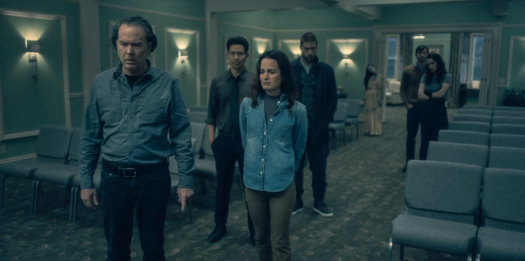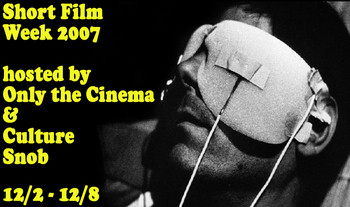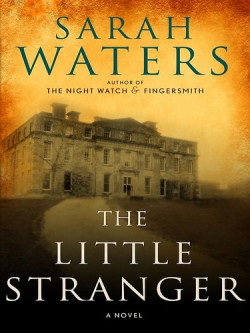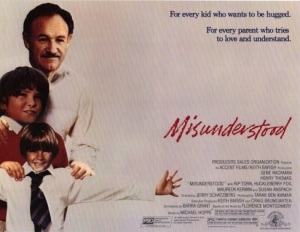Finding Darkness in the Light
 Revisiting Netflix’s The Haunting of Hill House helped clarify the fundamental dissonance of the show – that running counter to its hopeful, tidy conclusion is something far messier in both its ghost and family stories. Yet the early episodes carve out room for readings that substantially darken the whole, undermining without negating the tone of its final minutes.
Revisiting Netflix’s The Haunting of Hill House helped clarify the fundamental dissonance of the show – that running counter to its hopeful, tidy conclusion is something far messier in both its ghost and family stories. Yet the early episodes carve out room for readings that substantially darken the whole, undermining without negating the tone of its final minutes.

 From December 2 through 8, Culture Snob and Ed Howard’s
From December 2 through 8, Culture Snob and Ed Howard’s  I start an essay for most every movie I see. Whether I actually finish the essay – or even make any headway on a thesis – is another matter entirely. Today I’ll be the old man who runs out of candy at Halloween and starts handing out worthless crap that’s lying around the house.
I start an essay for most every movie I see. Whether I actually finish the essay – or even make any headway on a thesis – is another matter entirely. Today I’ll be the old man who runs out of candy at Halloween and starts handing out worthless crap that’s lying around the house. The narrator of The Little Stranger would tell you that this tale is about grave misfortune, not a haunted house. His name is Dr. Faraday, and in Sarah Waters’ agonizingly patient gothic novel set in post-World War II Britain, he has a dismissal available for any odd happening at Hundreds Hall. You’re tired. It’s an old house. Those must have been there for years. He seems the opposite of the classic unreliable narrator – he’s too reliable, and at points in the book he so tediously rules out the supernatural that you want some apparition to shove a hot poker up his ass. If this sounds like a criticism, it’s a mild one, as this is surely the effect that Waters sought, anatomical specificity aside. Faraday is so sane and logical that he has no credibility in the context of this story.
The narrator of The Little Stranger would tell you that this tale is about grave misfortune, not a haunted house. His name is Dr. Faraday, and in Sarah Waters’ agonizingly patient gothic novel set in post-World War II Britain, he has a dismissal available for any odd happening at Hundreds Hall. You’re tired. It’s an old house. Those must have been there for years. He seems the opposite of the classic unreliable narrator – he’s too reliable, and at points in the book he so tediously rules out the supernatural that you want some apparition to shove a hot poker up his ass. If this sounds like a criticism, it’s a mild one, as this is surely the effect that Waters sought, anatomical specificity aside. Faraday is so sane and logical that he has no credibility in the context of this story. The unfathomably fashionable torture film has spun off a welcome girl-power subgenre, in which determined, attractive young females facilitate the agonizing dispatches of men who have committed atrocities against youth. But two early entries – Hard Candy and Lady Vengeance – are misguided.
The unfathomably fashionable torture film has spun off a welcome girl-power subgenre, in which determined, attractive young females facilitate the agonizing dispatches of men who have committed atrocities against youth. But two early entries – Hard Candy and Lady Vengeance – are misguided. As a member of the choir, I ran screaming from the church because of Michael Moore’s preaching in Sicko. Plus: the equally inept Infamous.
As a member of the choir, I ran screaming from the church because of Michael Moore’s preaching in Sicko. Plus: the equally inept Infamous. There’s a maxim that says a movie teaches you how to watch it, but Peter Weir’s The Truman Show teaches you how to watch it the wrong way. And in its brazen audience cues, it hints that you should question your reaction to the film. This is a movie that was made for misunderstanding.
There’s a maxim that says a movie teaches you how to watch it, but Peter Weir’s The Truman Show teaches you how to watch it the wrong way. And in its brazen audience cues, it hints that you should question your reaction to the film. This is a movie that was made for misunderstanding. Have you ever read or heard a discussion of a movie that made you think, They just don’t get it? Have you ever wondered, Am I the only person who saw the movie that way? Culture Snob is hosting a forum for essays, arguments, and provocations on misunderstood movies. The blog-a-thon will run Wednesday, May 16, through Sunday, May 20, although I won’t turn my nose up at contributions that arrive before then. The premise is that movies are marketed and evaluated coarsely and simplistically, and that they often contain a richness that’s never mined by critics and casual audiences.
Have you ever read or heard a discussion of a movie that made you think, They just don’t get it? Have you ever wondered, Am I the only person who saw the movie that way? Culture Snob is hosting a forum for essays, arguments, and provocations on misunderstood movies. The blog-a-thon will run Wednesday, May 16, through Sunday, May 20, although I won’t turn my nose up at contributions that arrive before then. The premise is that movies are marketed and evaluated coarsely and simplistically, and that they often contain a richness that’s never mined by critics and casual audiences.